|

The Philadelphia Daily News; Philadelphia, Pennsylvania
Obituaries, Posted on Sat, Aug. 9, 2008
Judith Eden, zoning visionary, dies at 61
By DAVID LEE PRESTON; Philadelphia Daily News; dpreston@phillynews.com 215-854-5159
WHEN JUDITH EDEN perceived a threat to Philadelphia - proliferating billboards, unsightly parking lots, proposed riverboat gambling, cell-phone towers, restaurant additions - she had the skills and the clout to fight it.
A zoning attorney and civic activist with a dry wit, a flair for design and a generous heart, she pla yed a significant role in Center City's transformation.
Partly due to her efforts, the city today boasts sidewalk cafes instead of buildings extending beyond their boundaries, and stately iron railings with brick pillars replacing chain-link fences around parking lots.
Judith Shuman Eden, a small-town girl from the Midwest whose love affair with her adopted city made her a powerful and influential figure in zoning and the arts, died of cancer yesterday at Pennsylvania Hospital. She was 61 and lived in Center City.
"Because of her knowledge of law and of zoning, and her ability to really make things happen, people had tremendous respect for her opinion on things," said Mary Tracy, executive director of the Society Created to Reduce Urban Blight, an anti-billboard group that Judith co-founded in 1990.
"No one has any idea of how much Judith has done in her quiet, behind -the- scenes way."
In the 1980s and '90s, as zoning chair of the Center City Residents Association, Judith devoted years to negotiating an agreement with Graduate Hospital to beautify nearby parking lots, resulting in a new standard for Center City. She also led a successful push for first-floor retail space in parking garages.
In October 2001, her activism spurred then-Mayor John F. Street to change course and veto a City Council bill that would have limited the right to appeal land -use decisions. The bill had been intended partly to protect the billboard industry from lawsuits filed by SCRUB, which had stopped billboards in six Commonwealth Court cases.
"It's a great day for all the people of Philadelphia," Judith, also a Democratic committeewoman, said at the time. "Zoning is at the heart of every civic organization, and this was an attack. "
By 2003, Judith's reputation prompted the Coalition of Philadelphia Neighborhood Associations to include her on a list of six people it urged Street to appoint to an opening on the Zoning Board of Adjustment.
Street chose Judith.
"Now that is a surprise," Inquirer columnist Tom Ferrick Jr. wrote at the time. "Judith is the scourge of the Zoning Board. The woman on the other side of the table who gives them nothing but grief.
"But the neighborhood groups were clamoring for someone on the board who knew about, you know . . . zoning. And design. And planning. And didn't curtsy whenever a developer passed by. And that's Judith."
In January, Mayor Nutter appointed her to the Zoning Code Commission so that she could continue to help shape Philadelphia.
"I call it the instant-gratification city," Judith told the Daily News a few days before she died. "You come here and you realize that Philadelphia is such a great place to live. You can walk in Center City from river to river, and see such an array of architectural treasures as there is literally nowhere else in the world."
She was born in West Lafayette, Ind. Her father relocated the family to Defiance, Ohio, and she graduated from high school there in 1965.
But she yearned for more than Defiance offered.
She enrolled in Russian studies at the University of Cincinnati, graduating in 1969. In a Russian class there in 1966, she befriended a classmate, Avi Eden. Judith had another boyfriend at the time, but Avi had his own plans.
"My strategy was to sit next to the prettiest girl and offer to tutor her, but it didn't work because she was smarter than I was," Avi recalled. "So we became friends, I went to Israel for a year, and when I came back we started to date."
They moved to the Boston area for law school, graduating in 1972 - Avi from Harvard and Judith from Boston University. They decided to marry.
The young couple moved to Philadelphia. They plunged into civic life, and filled their home with the work of young local artists. Some, like Virgil Marti and Stuart Netsky, would later become nationally known.
The Edens' living room became a salon peopled by a steady parade of artists, writers and intellectuals - many of whom ended up moving in.
Patrick J. Egan, an assistant professor of politics at New York University, lived in the Eden ho me for two summers when he was a graduate student.
"I called Judith asking if she knew anyone willing to sublet an apartment for a few months," Egan said. "She surprised me by responding, 'Why don't you just come live with us?'
"Life with Judith Eden could be intimidating at first. You'd walk into the living room where she was sitting amidst piles of newspapers and magazines - and then she'd just start to interrogate you. She wanted to know about everything, and she was whip-smart and very opinionated.
"But once you'd proven your mettle with her, she showered you with this fierce, loyal love that could only be called maternal. At the Edens' encouragement, I kept a key to their front door for years afterward. Like so many others, I was part of the extended family."
Judith was active in many civic organizations and causes, including: the Print Center, the Franklin Inn Club, MANNA, the AIDS Fund, the Liberty City Democratic Club, the Mural Arts Program, the Philly Fringe arts festival, the board of the Center City District, and the advisory board of the Enchantment Theatre Company.
"She was such an inspiration to all of us women," said Colleen Puckett, founder and ex-president of the Coalition of Philadelphia Neighborhood Associations. "Because she was such a feminist but she loved to dress. She always had these funky, elegant glasses, was always well put-together, was very elegant but quirky, with a sense of humor. She had the driest sense of humor."
Judith wanted it known that she died wearing nightwear from her lifelong collection of novelty pajamas depicting travel, holidays and other themes.
In addition to her husband, she is survived by two sons, Amiram, editor-in-chief of the Jewish Telegraphic Agency, and Jacob; a daughter, Carlie Seltzer; her parents, Richard and Marion Shuman; a sister, Rebecca Shuman; a brother, Chuck Shuman; and four grandchildren.
Services: Sunday at Goldstein's Raphael Sacks on North Broad Street. Final arrangements are incomplete. Donations, in lieu of flowers, should be made to the Mural Arts Program, SCRUB or Center City Eruv Corp. *
Source: Philadelphia Daily News
The Philadelphia Inquirer, Philadelphia, Pennsylvania
Obituaries: Posted on Sun, Aug. 10, 2008
Judith Eden, activist zoning lawyer
By David O'Reilly, Inquirer Staff Writer
Judith Eden, 61, of Center City, a fierce and longtime advocate for a beautiful, livable Philadelphia, died of cancer Friday at Pennsylvania Hospital.
An activist zoning lawyer who made a name for herself battling billboards and advocating for sidewalk cafes, Ms. Eden served four years on the Zoning Board of Adjustment, an agency with which she had battled for nearly two decades.
"Now that is a surprise," Inquirer columnist Tom Ferrick Jr. wrote in 2003. "Judith is the scourge of the Zoning Board. The woman on the other side of the table who gives them nothing but grief."
Mayor Nutter appointed her in January to the Zoning Code Commission. "Because of her knowledge of law and of zoning and her ability to really make things happen, people had tremendous respect for her opinion on things," Mary Tracy, executive director of the Society Created to Reduce Urban Blight (SCRUB), told the Philadelphia Daily News.
Ms. Eden cofounded that group in 1990. "No one has any idea of how much Judith has done in her quiet, behind-the -scenes way," Tracy said. Ms. Eden was born in West Lafayette, Ind., and grew up in Defiance, Ohio. She is survived by her husband, Avi; sons Ami and Jacob; a daughter, Carlie Seltzer; her parents, Richard and Marian Shuman; a brother; a sister; and four grandchildren.
Funeral services will be held at 2:30 p.m. today at Goldsteins' Rosenberg's Raphael-Sacks Funeral Home, 6410 N. Broad St. Burial will be in Montefiore Cemetery, Jenkintown. Memorial donations may be made to the Mural Arts Program, SCRUB, or the Center City Eruv Corp.
Contact staff writer David O'Reilly at 215 -854-5723 or doreilly@phillynews.com.
Source: Philadelphia Inquirer
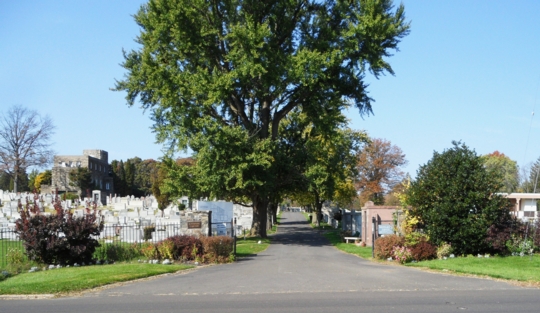
Above: Montefiore Cemetery, Jenkintown, Montgomery County, Pennsylvania.
The Jewish Exponent, Philadelphia, Pennsylvania
Judith Eden, 61, Active in City Life, Politics
August 14, 2008
Bryan Schwartzman, Staff Writer
Judith Shuman Eden, a 61-year-old attorney, community activist and political player who was deeply involved in the long process of rejuvenation in Center City, died Aug. 8 at Pennsylvania Hospital, the result of a protracted battle with cancer.
Eden was an opponent of urban blight who used a prodigious knowledge of land-use law and an outsized personality to advocate for mixed-use development and a city that was truly hospitable to its residents. The native Midwesterner left an indelible mark on her adopted Philadelphia, first as a civic activist who, through her work with the Center City Residents Association and the Society. Created to reduce urban blight, often did battle with the city's zoning board and the powers-that- be.
In 2003, armed with her knowledge of the law and years of experience in zoning disputes, Philadelphia Mayor John F. Street appointed Eden to that same board.
Both Street and current Mayor Michael Nutter -- who have had no shortage of public disagreements -- were among the hundreds who attended Eden's Aug. 9 memorial service at Goldsteins' Rosenberg's Raphael-Sacks on North Broad Street. Friends cited this as another example of the tenacious woman's ability to bring people on opposite sides of an issue together.
One such example came in the late 1990s, when she brokered a meeting between then City Council President Street -- political observers said at the time that she was one of the few Center City activiists who was close to the North Philadelphia politician -- and representatives of the gay and lesbian community. The result: Street switched positions and supported a measure granting domestic partnership benefits to city workers.
Eden did have a partisan side; she served for a time as a Democratic ward leader.
She was also an unofficial adviser to the Center City Eruv Corporation and active with the city's Mural Arts Program.
Born in West Lafayette, Ind., Eden later moved to Defiance, Ohio. She grew up in a Protestant household and met her husband while a student at the University of Cincinnati.
The two moved to Boston to attend law school: in 1972, Avi Eden graduated from Harvard University and Judith Shuman from Boston University. Before they were married, she underwent conversion to Judaism. They moved to Philadelphia soon afterward.
Family members said that Eden was as devoted to her adopted faith as she was to her adopted city. Members for some time of Temple Beth Zion-Beth Israel, Eden made sure that her children attended Jewish day school.
Her older son, Ami Eden, said that his mother possessed an inexhaustible intellectual curiosity, endlessly pouring over books, magazines and newspapers. Eden, currently editor- in-chief of the Jewish Telegraphic Agency and a former Jewish Exponent news editor, also described her as someone who could relate to people from all backgrounds and move effortlessly between different worlds.
In addition to her husband and son, she is survived by another son, Jacob Eden; a daughter, Carlie Seltzer; her parents, Richard and Marion Shuman; sister Rebecca Shuman; brother Chuck Shuman; and four grandchildren.
Copyright © Jewish Publishing Group
Source: The Jewish Exponent, Philadelphia, Pennsylvania
Friday, August 29, 2014
Plan Philly
How to keep a city advocate’s fire burning
  Saturday, February 28, 2009 Saturday, February 28, 2009
By Thomas J. Walsh For PlanPhilly
Most cities exist amid striking dichotomies. From what we understand about the late Judith Eden, an “activist extraordinaire” who passed away last August, she knew that better than anyone.
So it’s safe to say that she would’ve highly enjoyed the forum that her husband, Avi Eden, held in her honor Thursday night at the Philadelphia Senior Center on South Broad Street, where he brought together a developer, an artist, a zoning attorney, an urban blight activist, an architecture critic, a senior Nutter administration official and, eventually, the mayor himself.
The topic: “Should the criteria for opposing development projects be re-assessed?” The short answer: a collective “always.”
Judith was not a preservationist and not a developer, Eden said. “She believed in good will and a lot of good faith. ... This is a panel of many people who knew her and cared for her deeply…”
There was good-natured back-and-forth for more than an hour, with Eden cracking wise often, under cover of a well-timed version of “I think Judith would’ve said...”
At the conclusion of the forum, Mayor Michael Nutter made a surprise appearance, and in short order demonstrated how he became mayor: he stole the show. Eden told him they had been discussing the possibility of development criteria in these tough economic times being perhaps less important than getting things built, and people into jobs.
“Obviously there is much more pressure to have economic activity in the city of Philadelphia, but I don’t necessarily know that we should lower our standards just because we’re in dire straits,” Nutter said. “I mean, things are bad, they’re going to be bad for a while, but it’s not going to last forever, and you know, bad projects usually stay bad for a long time.”
The guy knows his audience. “Somebody’s going to ask someday, ‘What were those folks thinking about 30 years ago?’ Most people are going to forget there was an economic crisis and we just had to have this absolutely horrible development because it was going to put hundreds of people to work and generate revenues. Having high standards, even in tough economic times, is important.”
Two of the panelists – Mary Tracey, executive director of SCRUB (Society Created to Reduce Urban Blight) and Jane Golden, executive director of the Mural Arts Program – said much the same thing during the preceding hour.
As did Inga Saffron, the Inquirer’s architecture critic, who shared her observations of the city’s improvements during the past 10 years, despite a system for guiding development which “couldn’t have been worse.”
“In good times and in bad times, your values have to remain the same,” Saffron said. “Of course it would be better if Philadelphia would streamline the approval process for development,” but “this is the perfect opportunity for revamping the zoning code, for planning the waterfront, and for developing new amenities.
“It’s also a time for taking stock and articulating the values that guide the city. That’s something that we haven’t done as well as we should. I thing a city’s fabric is like a trust, or an endowment – you just don’t want to touch the principle.”
“The most important thing that Judith brought to the table and to the process was an understanding of the balance, meaning that a developer had certain rights and obligations, but also a defined plan that needed to be promoted,” said Peter Kelsen, a zoning attorney who worked with Eden for 25 years, most recently as a fellow Zoning Code Commissioner.
“And that the community had a [voice], and they needed to be protected and supported when it came to those fundamentals. But she understood that both parties had to give of each other, and to reach a commonality, so that the projects could move forward, and the communities could benefit from them, and the projects could benefit from the fact that the community supported them. That’s something that is a very rare commodity based on my experience with the zoning law in Philadelphia. It’s changing – but it’s not even close to being there yet.”
The “designated bad guy” on the panel was the affable Bob Rosenthal, formerly of Westrum Development and currently vice president of The Reinvestment Fund, with offices in Philadelphia, Baltimore and Washington, D.C. Eden introduced him briefly by saying he is now with a nonprofit developer, but added quickly, “Of course they’re all nonprofits now.”
It was one of many laughs during an unusually relaxed and congenial discussion, especially for the type- As on the stage of the small auditorium, decorated – as Eden himself was – with Mardi Gras trimmings, another tribute to Judith, who “liked to marry kitsch to high art” and looked at Mardi Gras as another example of urban joy.
Rosenthal, in answering a question from one attendee, recalled his experiences with Westrum in a forlorn section of the city. “In Brewerytown, where there was no development, we bought 14 acres of abandoned property. There hadn’t been any development in the area and there was no civic association. It’s an interesting question: Do you help start the civic association?” More laughs. “But you decide what the right thing to do is, because you need the community.”
Earlier, Rosenthal channeled Ronald Reagan’s “nine most terrifying words” by saying his own “eight most feared words” used to be, “The meeting has moved to the high school.”
Prerogative
Panelist Terry Gillen, Nutter’s senior economic development official and the head of the Redevelopment Authority, said she’s been thinking a lot about the issue of development versus the status quo in her latest positions, and in so doing introduced what might have been the theme of the night.
“In Philadelphia, City Council members have a very strong role – councilmanic prerogative – where almost any major development ... or almost any vacant land transaction, has to go through City Council,” she said. It’s a controversial topic – deemed unethical by some citizen watchdog groups – but she said she thought she could speak for the mayor by arguing that, “Councilmanic prerogative is ... often a good thing. It is, many times, the thing that stands between you and a really bad project. If you think about it, councilmanic prerogative is really a proxy for the community’s voice.”
Sometimes, Council members may not even have an opinion on a proposal, but could speak for constituents through this vehicle. And it has been serving another purpose, too, Gillen added – by necessity.
“I think the reason councilmanic prerogative has become so strong in Philadelphia is because of the lack of planning,” Gillen said. “The city had sort of just abdicated its role as a planner and so you have community groups stepping in and council members ... I am hopeful that [the Nutter administration] will be able to swing the pendulum back.”
Nutter, unaware that the subject had been discussed, was slightly put on the spot by Avi and Judith’s son, Ami Eden, a journalist, who asked if “Mayor Nutter” had a different opinion of the prerogative than “Councilman Nutter.”
“It’s a relatively small legislative body – 17 members,” Nutter said, after some thought. When trying to make something happen, “on any given day, you really don’t care who the other eight people are when you’re trying to get something done. You can’t be choosy. Getting elected to office has a lot of power – it also has a lot of responsibility. Used properly, this particular privilege of support from your colleagues can be a very positive thing. Not only what you can make happen, but what sometimes you can stop from happening.”
He related an experience from his freshman year as a councilman, in 1992. A developer, armed with two powerful attorneys and the backing of then-Mayor Rendell, wanted to build a 725,000 square foot shopping center across Belmont Avenue from a golf course near City Avenue and needed a zoning change.
“So it’s little ‘ole me, the mayor, two powerful lawyers, and the developer. It’s 1992 – city on the verge of bankruptcy. That’s the scenario. And because my colleagues understood the negative impact that that would have on our community, no one would introduce the necessary zoning legislation to allow that bad thing to happen. That’s my personal experience with this phenomenon. Now, used improperly, you can be the worst possible obstacle to making something happen.”
Judith’s fabric
Judith Shuman Eden was a private practice attorney and a former Zoning Board of Adjustment member. In 2008, she had been appointed to the Zoning Code Commission. She was also a past co-chair of the Center City Residents’ Association and was on the boards of the Center City District and the Friends of the Mural Arts Program.
Before the discussion, the crowd gathered for a reception next door at the restored Mother Divine Mission. The Preservation Alliance of Greater Philadelphia describes the south Broad Street mansion as “an exuberant red brick and sandstone design influenced by the work of Frank Furness” possessing a “lavish interior with a high level of historic integrity.” It’s not an overstatement.
“Judith always said and felt that the trouble in Philadelphia is that we really love this city the way it is, and we love everything there is about the city – as it is,” Eden told the crowd. “And it’s going to be very hard for somebody to convince us that we need to change the basic fabric of our city to improve it dramatically.
“That’s why she always felt you needed to interact with everybody and get everybody together, so that the fabric was preserved.”
Contact the reporter at thomaswalsh1@gmail.com.
Source: Plan Philly
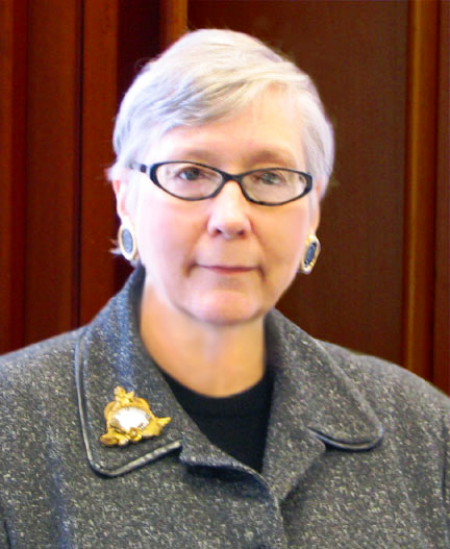
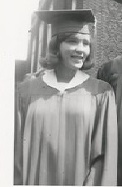
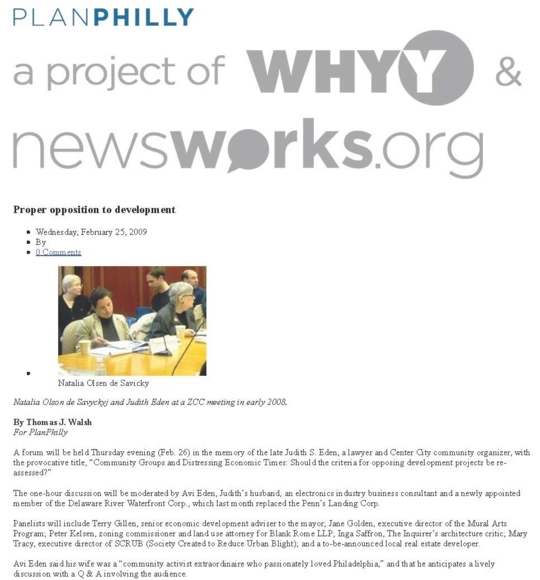
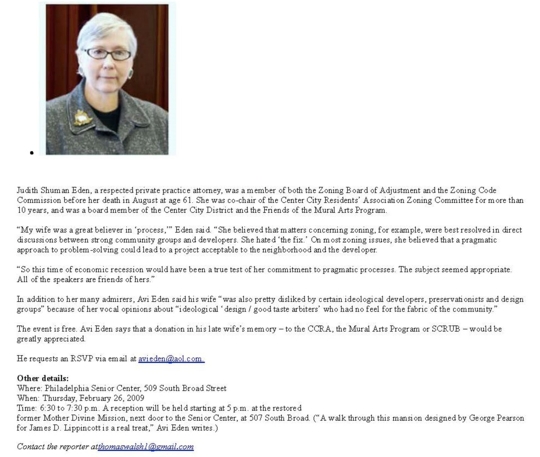
%20-%20Find%20A%20Grave%20Memorial_Page_1.jpg)
%20-%20Find%20A%20Grave%20Memorial_Page_2.jpg)
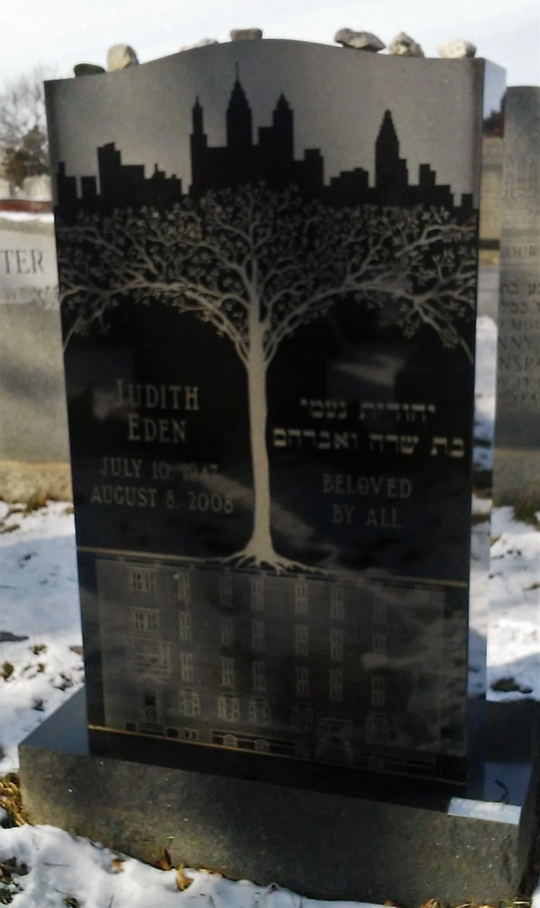
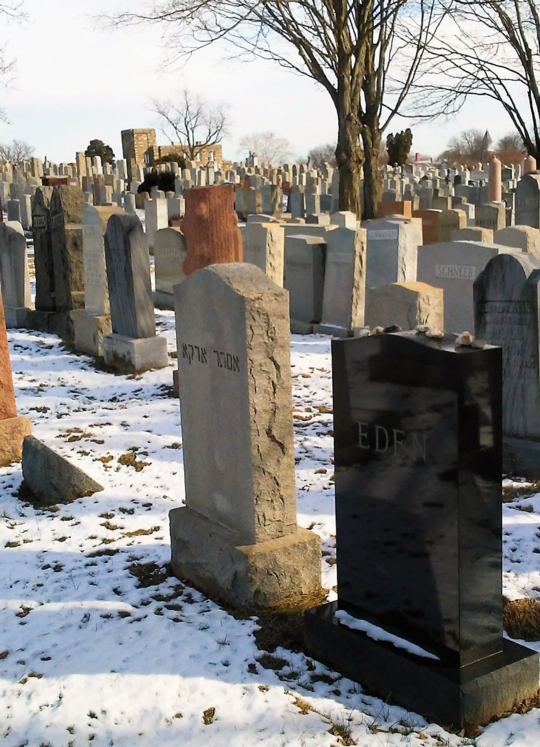
|
Jan Buhrer (Craig)
Judi was a lifelong best friend... she was an adopted sister and member of my family... and I miss her SO much. There are a whole treasure-chest of wonderful memories .. of Judi and her beautiful family!
Joseph LaLonde
What a life well-lived! I was previleged to have known her but a short time. She was smart, thoughtful, insightful, kind, assertive, and lovely. Although our time was short she played a big part in my life, which I will always cherish.
Joe Lalonde
Marge Cameron
Philadelphia is so much richer due to Judi and her passion to improve her home. I am proud to have known her and wish she was still with us. She certainly channeled her intellect and determination into something meaningful. It's a good example for all of us, no matter how much time we have left in this world!
Michael Perez
I actually had no idea that Judith and I were both originally from Lafayette/West lafayette and then transplanted to Defiance. I remember always thinking that she and Margie Cameron were two of the smartest people I knew so her accomplishments during her too short life come as no surprise.